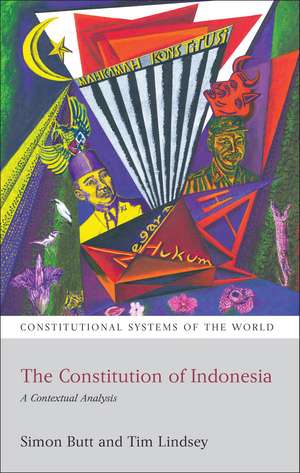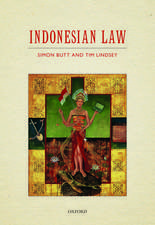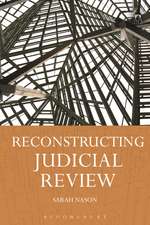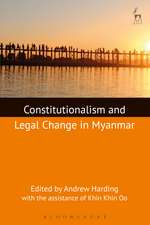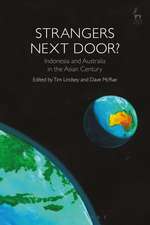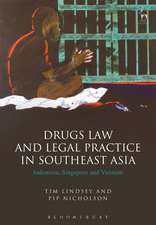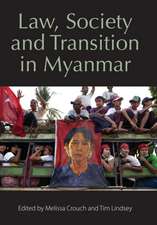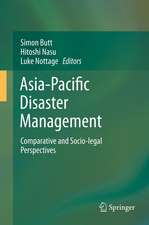The Constitution of Indonesia: A Contextual Analysis: Constitutional Systems of the World
Autor Simon Butt, prof Tim Lindseyen Limba Engleză Paperback – 28 aug 2012
Din seria Constitutional Systems of the World
- 13%
 Preț: 174.07 lei
Preț: 174.07 lei - 38%
 Preț: 134.64 lei
Preț: 134.64 lei - 23%
 Preț: 197.68 lei
Preț: 197.68 lei - 14%
 Preț: 147.59 lei
Preț: 147.59 lei - 34%
 Preț: 509.52 lei
Preț: 509.52 lei - 28%
 Preț: 374.41 lei
Preț: 374.41 lei - 40%
 Preț: 466.81 lei
Preț: 466.81 lei - 22%
 Preț: 263.72 lei
Preț: 263.72 lei - 23%
 Preț: 185.93 lei
Preț: 185.93 lei - 19%
 Preț: 166.82 lei
Preț: 166.82 lei - 23%
 Preț: 152.82 lei
Preț: 152.82 lei - 21%
 Preț: 218.26 lei
Preț: 218.26 lei - 23%
 Preț: 178.47 lei
Preț: 178.47 lei - 19%
 Preț: 303.62 lei
Preț: 303.62 lei - 18%
 Preț: 300.14 lei
Preț: 300.14 lei - 30%
 Preț: 510.03 lei
Preț: 510.03 lei - 14%
 Preț: 192.30 lei
Preț: 192.30 lei - 18%
 Preț: 304.66 lei
Preț: 304.66 lei - 23%
 Preț: 178.02 lei
Preț: 178.02 lei - 18%
 Preț: 225.31 lei
Preț: 225.31 lei - 23%
 Preț: 197.14 lei
Preț: 197.14 lei - 18%
 Preț: 180.44 lei
Preț: 180.44 lei - 18%
 Preț: 179.98 lei
Preț: 179.98 lei - 18%
 Preț: 186.35 lei
Preț: 186.35 lei - 14%
 Preț: 179.00 lei
Preț: 179.00 lei - 16%
 Preț: 218.47 lei
Preț: 218.47 lei - 19%
 Preț: 184.14 lei
Preț: 184.14 lei - 18%
 Preț: 297.58 lei
Preț: 297.58 lei - 16%
 Preț: 218.00 lei
Preț: 218.00 lei - 23%
 Preț: 171.85 lei
Preț: 171.85 lei - 18%
 Preț: 225.49 lei
Preț: 225.49 lei - 14%
 Preț: 185.93 lei
Preț: 185.93 lei - 13%
 Preț: 230.79 lei
Preț: 230.79 lei - 13%
 Preț: 186.10 lei
Preț: 186.10 lei - 19%
 Preț: 179.10 lei
Preț: 179.10 lei -
 Preț: 223.20 lei
Preț: 223.20 lei - 18%
 Preț: 180.44 lei
Preț: 180.44 lei -
 Preț: 217.09 lei
Preț: 217.09 lei - 18%
 Preț: 186.35 lei
Preț: 186.35 lei
Preț: 232.54 lei
Preț vechi: 281.97 lei
-18% Nou
Puncte Express: 349
Preț estimativ în valută:
44.50€ • 46.46$ • 36.83£
44.50€ • 46.46$ • 36.83£
Carte tipărită la comandă
Livrare economică 05-19 aprilie
Preluare comenzi: 021 569.72.76
Specificații
ISBN-13: 9781849460187
ISBN-10: 1849460183
Pagini: 340
Dimensiuni: 138 x 216 x 20 mm
Greutate: 0.43 kg
Ediția:New.
Editura: Bloomsbury Publishing
Colecția Hart Publishing
Seria Constitutional Systems of the World
Locul publicării:London, United Kingdom
ISBN-10: 1849460183
Pagini: 340
Dimensiuni: 138 x 216 x 20 mm
Greutate: 0.43 kg
Ediția:New.
Editura: Bloomsbury Publishing
Colecția Hart Publishing
Seria Constitutional Systems of the World
Locul publicării:London, United Kingdom
Caracteristici
This book analyses the constitution of Indonesia assessing the implementation of it's new constitutional model and identifying its weaknesses.After covering key institutions exercising executive, legislative and judicial powers, the book focuses on key current constitutional debates, ranging from human rights to decentralisation, religious freedom and control of the economy.A useful tool for students studying the constitution of Indonesia or comparative constitutional law as well as anyone with an interest in the Indonesian constitution.Written by experts in the field.
Notă biografică
Simon Butt is Senior Lecturer at Sydney Law School. Tim Lindsey is Malcolm Smith Professor of Asian Law and Director of the Asian Law Centre and the Centre for Islamic Law and Society at the University of Melbourne.
Cuprins
1 Indonesia's Constitutions IntroductionIntegralism in Indonesian Constitutional Thought The Pancasila The Pancasila and Integralism The Persistence of Liberal Democratic Ideas: Law as Memory 1Dismantling Integralism ConclusionSelected Reading 2 The Presidency Introduction The Constitution and the Presidency under the New OrderAmendment of Constitutional Provisions Relating to the President Presidential Powers under the Amended Constitution The Presidential Advisory Council The Cabinet and Ministers Replacement of the President Impeachment and Dismissal ConclusionSelected Reading 3 National Legislatures, Representative Assemblies and Elections Introduction The Reconstruction of Indonesia's Legislative System The Indonesian Legislative System Today General Elections The Constitutional Court's Candidacy and Electoral Jurisprudence General Electoral Commission Conclusion Selected Reading 4 Judicial Power Introduction The Lower Courts Special Courts Within the General Courts The Supreme Court Judicial Appointments and Tenure Judicial Reform The Judicial Commission The Ombudsman Conclusion Selected Reading 5 The Constitutional Court and its Jurisdiction Powers of the Constitutional Court The Constitutional Court's Composition Judicial Review Disputed Returns and Election-Related Jurisdiction Expanding its Own Jurisdiction2011 Amendments to the Constitutional Court Law The Court Strikes Back Conclusion Selected Reading 6 Decentralisation Introduction Background Regional Government Institutions Regional Government Jurisdictions Avenues for Central Government Control? Jurisdictional Dispute Resolution Creating New Regions Special Autonomy Conclusion Selected Reading 7 Human Rights Introduction National Human Rights Commission (Komnas HAM) Part I: Express Constitutional Rights Part II: Implied Rights and the Negara hukum Part III: Obligations Conclusion Selected Reading 8 Religion, Pluralism and Pancasila Introduction The Religious Courts Case Polygamy Case The Preamble: Islam, the Pancasila and the Jakarta Charter Guarantees of Religious Freedom: Articles 29, 28E and 28I Article 28J: Restrictions on Freedom of Religion Recognition of 'Beliefs' (Kepercayaan) Conclusion Selected Reading 9 Article 33 and Economic Democracy Introduction 'State Control' Article 33(4): Principles of the National Economy Conclusion Selected Reading International Constitutional Provisions National Legislation Other National Regulations and Subordinate Laws National Decrees Subnational Regulations Table of Cases and Decisions Constitutional Court Decisions Other Decisions Bibliography
Recenzii
...the book will likely become a must-read for students and researchers of Indonesia. [It is] a good introduction to comparative and area studies, as it gives an excellent overview of the institutional framework of the country and its socio-political debates. Butt and Lindsey prove than an analysis that takes the Constitution as its lens can produce a balanced and well-rooted picture not only of the legal-institutional structure of a given country, but also of its social and historical backdrop.
Descriere
For decades, Indonesia's 1945 Constitution, the second-shortest in the modern world, was used as an apologia by successive authoritarian regimes. But following the fall of President Soeharto in 1998 the amendment of the Constitution ushered in a liberal democratic system. This book surveys this remarkable constitutional transition.
